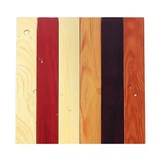When it comes to architectural and decorative materials, aluminum solid panels have gained significant popularity due to their durability, versatility, and aesthetic appeal. As a leading supplier of aluminum solid panels, I often receive inquiries about the weight of these panels per square meter. Understanding the weight is crucial for various reasons, including structural design, transportation, and installation. In this blog post, I will delve into the factors that influence the weight of aluminum solid panels and provide a comprehensive overview of what you can expect.
Factors Affecting the Weight of Aluminum Solid Panels
The weight of aluminum solid panels per square meter is not a fixed value and can vary depending on several factors. The primary factors include the thickness of the panel, the alloy used, and any additional coatings or finishes.
Panel Thickness
One of the most significant factors influencing the weight of aluminum solid panels is their thickness. Thicker panels naturally weigh more than thinner ones. Aluminum solid panels are available in a range of thicknesses, typically from 1mm to 6mm. As the thickness increases, so does the weight per square meter. For example, a 1mm thick aluminum solid panel will weigh less than a 3mm thick panel of the same size and alloy.
Aluminum Alloy
The type of aluminum alloy used in the panel also plays a crucial role in determining its weight. Different alloys have different densities, which directly affect the weight of the panel. Commonly used aluminum alloys for solid panels include 3003 and 5005. Alloy 3003 is a general-purpose alloy known for its good formability and corrosion resistance. Alloy 5005, on the other hand, offers higher strength and better surface finish. The density of these alloys can vary slightly, resulting in different weights for panels of the same thickness.
Coatings and Finishes
Additional coatings and finishes applied to the aluminum solid panels can also add to their weight. For example, a panel with a powder coating or a PVDF (Polyvinylidene Fluoride) finish will weigh more than an uncoated panel. These coatings not only enhance the appearance of the panels but also provide protection against corrosion, weathering, and UV radiation.
Calculating the Weight of Aluminum Solid Panels
To calculate the weight of an aluminum solid panel per square meter, you need to know the density of the aluminum alloy and the thickness of the panel. The formula for calculating the weight is as follows:
Weight (kg/m²) = Density (kg/m³) x Thickness (m)
The density of aluminum alloys typically ranges from 2,700 kg/m³ to 2,800 kg/m³. For example, if you have a 3mm thick aluminum solid panel made from an alloy with a density of 2,700 kg/m³, the calculation would be as follows:
Thickness = 3mm = 0.003m
Weight = 2,700 kg/m³ x 0.003m = 8.1 kg/m²
This means that a 3mm thick aluminum solid panel made from this alloy would weigh approximately 8.1 kilograms per square meter.
Typical Weight Ranges for Aluminum Solid Panels
Based on the factors mentioned above, the weight of aluminum solid panels per square meter can vary within a certain range. Here are some typical weight ranges for different panel thicknesses:
- 1mm thick panels: Approximately 2.7 - 2.8 kg/m²
- 2mm thick panels: Approximately 5.4 - 5.6 kg/m²
- 3mm thick panels: Approximately 8.1 - 8.4 kg/m²
- 4mm thick panels: Approximately 10.8 - 11.2 kg/m²
- 5mm thick panels: Approximately 13.5 - 14 kg/m²
- 6mm thick panels: Approximately 16.2 - 16.8 kg/m²
It's important to note that these are approximate values and the actual weight may vary depending on the specific alloy and any additional coatings or finishes.
Importance of Knowing the Weight
Understanding the weight of aluminum solid panels per square meter is essential for several reasons:


Structural Design
Architects and engineers need to consider the weight of the panels when designing the structure that will support them. The weight of the panels can affect the load-bearing capacity of the building and the overall structural integrity. By knowing the weight, they can ensure that the structure is designed to safely support the panels without any issues.
Transportation
The weight of the panels also impacts transportation costs. Heavier panels require more fuel and may require special handling equipment. By knowing the weight, you can accurately estimate the transportation costs and plan accordingly.
Installation
During installation, the weight of the panels can affect the ease of handling and the installation process. Heavier panels may require more manpower and specialized equipment to install. By knowing the weight, you can ensure that the installation team is properly equipped and trained to handle the panels safely.
Our Aluminum Solid Panel Products
As a supplier of aluminum solid panels, we offer a wide range of products to meet the diverse needs of our customers. Our panels are available in various thicknesses, alloys, and finishes to suit different applications.
- Aluminum Siding Panel Sheet: These panels are ideal for exterior cladding applications. They provide excellent protection against the elements and enhance the aesthetic appeal of the building.
- Cladding Flexible Stone Grain Aluminum Panels: These panels are designed to mimic the look of natural stone. They are lightweight, easy to install, and offer a cost-effective alternative to traditional stone cladding.
- Curtain Wall Wood Grain Aluminium Veneer: These panels are perfect for curtain wall applications. They provide a modern and elegant look while offering excellent insulation and energy efficiency.
Contact Us for Procurement
If you are interested in purchasing aluminum solid panels or have any questions about their weight, specifications, or applications, please feel free to contact us. Our team of experts is ready to assist you with your procurement needs and provide you with the best solutions for your project.
References
- Aluminum Association. (n.d.). Aluminum Design Manual. Retrieved from [Aluminum Association Website]
- ASM International. (n.d.). ASM Handbook: Properties and Selection: Nonferrous Alloys and Special-Purpose Materials.




